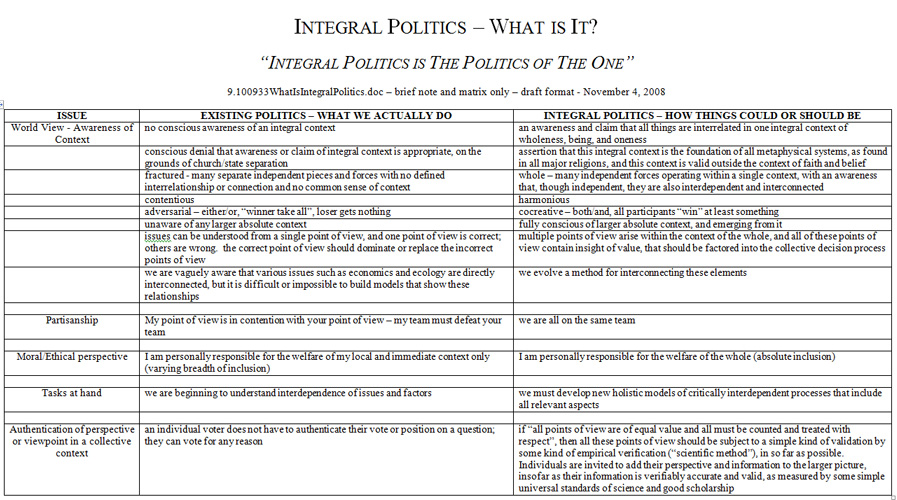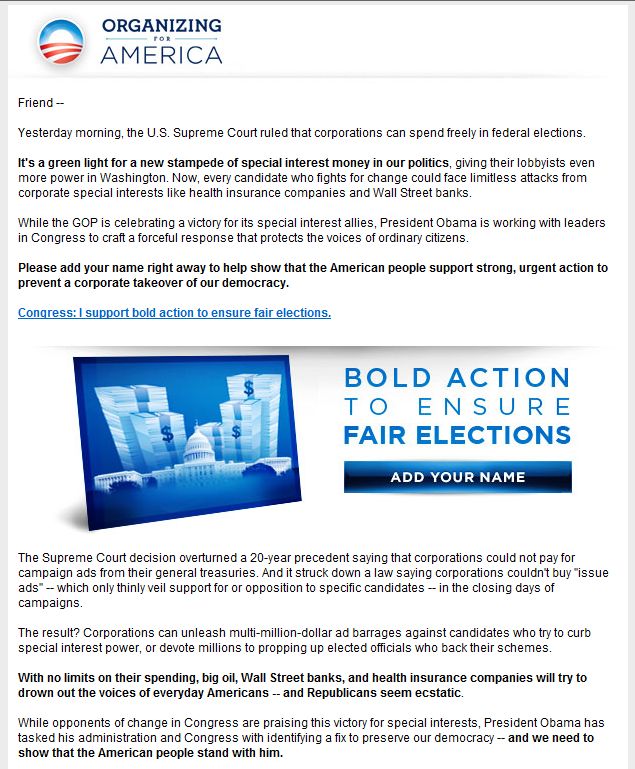|
Dawn's Early Light
IDEOLOGY VERSUS INTEGRAL
From: Bruce Schuman
- Albert Einstein ********** A few days ago, the Supreme Court released a powerful decision that appears likely to have significant consequences for American politics. They decided, generally on the grounds of "free speech", that corporations should have the right to unlimited spending on a political candidate. There is a firestorm brewing on this decision -- which, I have heard it said, overturns more than 100 years of settled law in the USA, going back to Teddy Rooseveldt. As I heard Jessie Ventura say a while back, and other voices are now beginning to say, maybe our senators and congress people should begin wearing jump-suits and logos like NASCAR stockcar racers, indicating their corporate sponsorship -- Joe Smith, the Senator from Exxon, Marilyn Jones the Senator from Bank of America... Corporatocracy, I heard one congressman call it last night. Well, this issue alone could be a very big deal. My guess is, it's going to be rolled back or fiercely resisted. But the way I see it, I think the decision by the Supreme Court, is indicative of a dangerous tendency in the "normal minds" of our decision-makers -- which is, to make decisions on the basis of a simple- minded ideology, instead of a comprehensive integral perspective that draws together and considers all the "unintended side-effects and consequences". Taken in isolation, the argument that restrictions on spending are restrictions on free speech, and therefore must be removed, could be defensible on what seems to me to be simplistic grounds. I haven't studied this issue carefully, as others surely will -- but what I think happened here is something that occurs too often in the context of the American political conversation. What I think I am looking at is a kind of "ideological oscillation" -- as a one-sided and over-simplistic ideology rises to the top and takes control -- until the weaknesses and unintended side-effects of this oversimplified view begin to wreck the country in ways the voters can recognize -- and then some alternative over-simplistic view rises to the top -- until it, too, begins to fail, and the oscillation begins to swing the other way. Right/left, conservative/progressive, libertarian/socialist, republican/democrat, these are fundamental underlying dimensions along which we try to measure political positions, and the basic dimensions of American political oscillation and instability. In a "transpartisan" kind of context, it seems essential that we begin to understand that the various ideologies that tend to be advocated in traditional American politics are generally one-sided aspect of a complex process of balancing -- and that this balance among competing forces and tendencies is essntial to the health of our democracy (our "democratic republic"). Seen this way, a radical libertarian point of view -- absoloute freedom for the individual, almost tending towards anarchy -- must be balanced against tendencies towards socialism or even "communisn". Yes, we want to strongly advocate for individual freedom. I feel that way myself. "Don't tread on me". But at the same time, critically important elements of society absolutely DO depend on cooperation, on creating collaborative institutions -- such as the military, the police department, the fire department, the schools... We cannot have a "society" or any kind of civilization without a social contract, that binds us together within the limits of a cooperative agreement. The radical liberatarian pushes against that need, trying to resist it, and tending to ignore the need for social collaboration and agreement. And the radical socialist or communist pushes in the opposite direction, tending to deny all individual human freedom in favor of the collective. Either way along this dimension, radicalism is unbalanced and destructive, and fails to include essential factors, making it dangerous. In this sense, many ideologies offer a tempting oversimplifcation, fueling the natural tendency among insular voters to a kind of moral smugness. I think we need a strong and clear model of how this works. It's no doubt out there, I just haven't found it -- but it seems quite clear that the healthy approach for a healthy society is to find a healthy balance -- and not to allow any one of these over-simplified -- and very often smug and self-righteous -- attitudes to dominate. Among my conservatiove friends, there is a tendency to a kind of moral smugness, because they are so certain that their simple ideals are absolute and should be enforced on the world. And my liberal friends -- are too often willing to throw out some of these principles -- seeing in the right of individuals to a kind of absolute local freedom to be inherently abusive and destructive. These tensions must always be balanced, and the "ideal democratic republic" should tend towards this balance at all times, striving for a kind of "optimization" of this balance. All voices included, in this process of "creative friction" and dialectic that was discussed by Andrew Cohen -- with no one side of the see-saw tending to dominate and throwing the entire process out of balance. My guess -- is that this recent Supreme Courty decision was made without adquate reference to the larger integral context. They were looking at issues of personal freedom in isolation (and who says a corporation is a "person"??) -- and were -- it seems likely to me -- not considering the larger consequences, and the overall balance of forces within our democracy. Give more power to the people with all the money -- and the people without money -- 90-plus % of us -- are going to have no voice. *** I think what is happening right now in American politics -- is that Obama is just starting to wake up to the fact that he essentially betrayed his promise to bring change, by surrounding himself with the same old power estabishment, and doing things the same old way. There's a building fury out there -- and I see it clearly articulated in messages sent to my networks -- as well as in other media -- and I'd say Obama needs to starting rowing his boat in a new direction, and pronto. Obama told us -- and said it again in speech yesterday -- "that it's not about me, it's about you". I was thrilled with that rhetoric two years ago -- but right now, I don't believe him when he says that. And it's not that he isn't sincere. He's just lost control of what that rhetoric means. He came into office promising "power to the people", and talked about his "big ears" and how he could listen. But since he got elected, he hasn't been listening -- he's gone totally top-down with the leftist power elite -- and now he's reaping the harvest -- and he's now talking about going on "a listening tour". Well, about time, Mister. I don't think it's too late. But I do think that "the people" need a much stronger organizing platform than anything that is available to them today. Obama was swept into office on a powerful wave of voter sentiment, that was largely coordinated and fueled at the local level through his "MyBO" web system. In that context, everybody had a voice, everybody could organize their own message content, their own advocacy, their own local or issue networks. And then, boom, Obama got elected, and that local freedom and independence and evocative creativity was replaced by an imposed top-down agenda determined entirely by the Democratic National Committee (DNC) and controlled from Washngton DC. I didn't like this when it happened, and I saw in this decision some very unfortunate consequences -- which I think are bearing fruit today. I did have the feeling at the time -- that these Dems barely understood what they were doing, and that nobody working for Obama had a clear idea of the powerful and beneficial commuitarian implications of the MyBO system. From their point of view, the point of MyBO was to elect Obama -- and after he was elected, the point is to sell his agenda. The "listening" aspects of the system were wiped out. "We ain't listening no more, the American people have spoken -- and you elected us. We rule now, that's the American way, so be a good citizen and do as you are told..." That's what it amounted to. After promising "change" for two years, we are right back to "politics as usual". What I see now, what I think is essential -- is that we find a powerful way to give voice to the people -- a way that is not controlled by a top-down power elite, or by some political party. We need to gather the "collective intelligence" of the American people, and put it to work on fixing this country -- while fully engaging our law-makers and political leaders in the process. I'd say we need something like a MyBO system, that operates somewhat like the old lobbying group "Common Cause" (still out there today). MyBO had 13 million members at its peak -- and Facebook today has something like 200-million-plus. We need to pull together everything we have learned about integral and communtarian approaches to politics, and convene a network process that pulls together "the voice of the people". The way I see it, it's really just an exercise in good network design. I think we know how to do this. And maybe, if we can get this thing moving -- we can continue to be "good Obama loyalists" along the way -- still following those high ideals he brought to us a year or two ago, and which we -- and the entire world -- found so inspiring.

************
|
